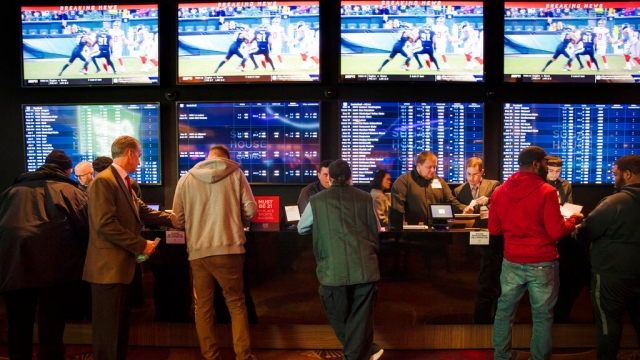Ads for sports betting were everywhere at Washington's Nationals Park on a recent game night.
Oddsmakers had favored the Nats' opponent, San Diego, with a $100 bet on the Padres netting $56.
Some fans were busy on their betting apps. "I bet on the Padres tonight. And if I hit this, I get 72. So I know we look like we don't want them to win, but I'm kind of hoping they do," said one spectator. "I have skin in the game, literally. And yeah, I love it," said another fan.
Since the Supreme Court ruled in 2018 that states could legalize gambling, 37 have done so, though three have yet to begin allowing bets.
Just three weeks after legal online sports betting launched in Florida in November 2021, a judge ruled that an agreement between the state of Florida and the Seminole Tribe was illegal and the issue remains in Federal court.
The American Gaming Association says the sports betting industry earned $7.5 billion in revenue last year.
But Declan Hill, a journalist and expert on match-fixing, says sports betting is jeopardizing American sports.
"I've seen sports leagues around the world be killed off because all it takes is just a bunch of fans looking at the Philadelphia Eagles and going, hang on a second. Was that call legitimate or not? Doesn't mean that the call wasn't legitimate, but it just means that the fans are starting to doubt. And then they say, hang on a second, the NFL has an official bookmaker?"
Since 2018, betting has become woven into the fabric of American sports, says John Affleck at Penn State University. It's something that's advertised heavily at sporting events. "Major media players such as ESPN have sports gaming shows. Innumerable websites and YouTube channels are devoted to the topic."
Late in January's Rose Bowl, Penn State was winning by three touchdowns over Utah, but sportscasters were alluding to the over/under. "Utah drove down the field and scored late, and the broadcasters calling the game, you know, were referring to the importance of this score," says Affleck. "The importance of the score was that it was going to put the final point total for both teams over the over."
"Some folks are still looking in to see if maybe Utah can reach the end zone," said one of the announcers. "It's not over at the moment, but that could change down there at the five-yard line."
SEE MORE: College betting scandals shine light on campus wagering
Gambling may add excitement, but it has led to scandals across the world. NBA referee Tim Donaghy pleaded guilty in 2007 to federal charges in a gambling scandal that rocked the league. He served 15 months in prison. And famously, in 1919, the Chicago White Sox were found guilty of deliberately losing the World Series.
So as gambling and sports get more intertwined, professional leagues are focusing on preventing cheating that could harm the integrity of the games.
The first step is monitoring the betting markets for suspicious activity. Andreas Krannich helps professional sports leagues globally avoid fraud at the Swiss sports data firm Sportradar.
"In [2021], we identified around 60 plus suspicious matches, which increased in 2022 to over 200 manipulated matches," says Krannich. The company provides data to the NBA, Major League Baseball, and a host of other pro leagues. Almost 350 betting companies provide betting data to Sportradar, which their software analyzes to find suspicious patterns. "This is 16.5 million bets per day. We see when they are placed second by second with a concrete amount, by which bookmaker."
Betting companies share data with U.S. sports leagues as well as analytics firms like Sportradar.
The leagues are now arranging new protections that would digitally prevent players or staff from using betting apps. When there are irregularities, authorities investigate and can uncover violations of rules barring betting by players.
Over the last five years, the NFL has found that at least seven players, one assistant coach, and a number of team staff members have violated its gambling policy.
That's evidence that the US leagues' fight against corruption is working, Krannich says.
"You see it from the sheer numbers we had in North America—less than 30 suspicious matches in 2022 out of over 1200 on a global scale," he says.
Krannich says poorly paid players in lower leagues are most susceptible to gambling crimes. "Match fixing attempts these days are focusing on lower divisions, he says.
That may be why there's a renewed focus on American college sports.
The University of Alabama fired baseball coach Brad Bohannon after alleged links to suspicious bets. As of this writing, the coach has not commented, and there have been no links to players. And the University of Iowa and Iowa State are investigating dozens of college athletes for suspected gambling.
Not long ago, several major sports leagues fought in court to stop legal sports betting from expanding.
I think we still strongly oppose legalized sports gambling. The integrity of our game is no. 1. We will not compromise on that.
Now the NFL, like the rest of the leagues, has embraced gambling.
And as for fans? Spectators at the Nationals-Padres games told Scripps News that any suspicions they may have had about manipulation haven't dampened their love for the game.
"I don't think it's like fixed or rigged, or anything. But I do know that, I mean, there's obviously some people that are gambling on the game that are playing and participating in it," said one fan. "If somebody is playing crazy or like throwing a game or match fixing, I'd be able to tell," said another.
The result of the game, by the way? Padres 7, Nationals 4



